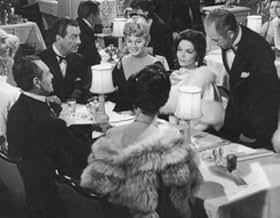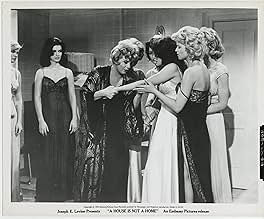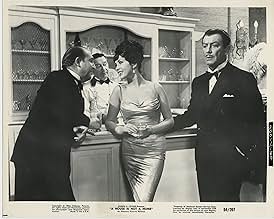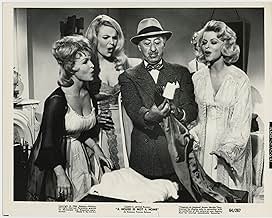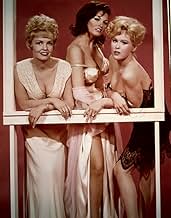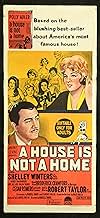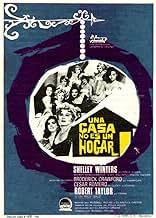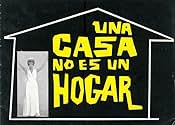Biopic of notorious New York City Madam Polly Adler, set during the Roaring Twenties.Biopic of notorious New York City Madam Polly Adler, set during the Roaring Twenties.Biopic of notorious New York City Madam Polly Adler, set during the Roaring Twenties.
- Director
- Writers
- Stars
- Nominated for 1 Oscar
- 1 nomination total
- Director
- Writers
- All cast & crew
- Production, box office & more at IMDbPro
Featured reviews
"Something was missing in this picture and to be blunt about it, the missing ingredient is sex! There is hardly a suggestion of it. It may or may not discourage impressionable young girls from a life of sin, but it certainly is enough to keep anyone away from the movie!"
Outside of the anecdotal (which couldn't be told), there wasn't much of a story so the movie becomes one long cautionary tale on the perils of prostitution which must have pleased the soon-to-be-out-of-a-job censors no end. Polly's girls reap only drug addiction and suicide while Shelly wrings her hands trying to help and the subtle-as-a-sledgehammer message is a woman who goes that route forfeits any right to love and happiness. The ladies looked lovely, however, and although Edith Head's gowns paid no attention to period detail, I caught a quick glimpse of Raquel Welch filling out one of them but I couldn't spot Edy Williams except in a photograph during the opening credits. It's directed by Russell Rouse, the auteur responsible for the 1966 laugh riot, "The Oscar", and has a Burt Bacharach title tune I forgot as soon as it was over. Helping to lend a TV air to it all were "special guest stars" (love them) like Broderick Crawford and Cesar Romero (as Lucky Luciano) paying lip service to near non-existent plot development but whenever my tastes are accused of being too lowbrow, I usually point with pride to the Academy Award-winning Shelley Winters. Why?? Shelley's down there with the best of them and although she's very good at things like blowzy, I now find her range rather limited -and that's OK. "Com'on Polly, do Theda Bara!" Indeed.
When the film begins, Polly (Shelly Winters) is a poor, struggling nice girl in 1930s Chicago. However, when she is raped, she is tossed out of her house and is forced to find a place to live. Frank (Taylor) offers to share an apartment with her. However, over time she slowly begins to help Frank by throwing parties for him and his bootlegger associates...and soon these become more regular and Polly finds herself a madame! She likes the work and doesn't need to sleep with anyone. Not surprisingly, complications arise and the glamorous life of a madame isn't all it's cracked up to be.
Through the course of the film, it alternates between drama, melodrama, sleazy exploitation movie as well as a comedy...and the way the film changes so rapidly is unconvincing and weird. Sadly, some of the funniest scenes are supposed to be poignant--such as the smack- addicted prostitute as well as the New Years celebration. Interspersed throughout the film is some incredibly preachy narration by Polly....again, meant to be poignant but eliciting laughter instead! Awkward and uncomfortable to say the least...as well as about as subtle as a board upside the viewer's head!! It's loud, over-the- top and utterly ridiculous trash...much like you'd see in "Valley of the Dolls". How this film isn't more infamous, I have no idea...but it's really bad and you have to see it to believe it! Entertaining garbage and nothing more.
Actually, I'm a fan of the Clarence Greene-Russell Rouse cycle of films. With all the flack Rouse is getting in the reviews for The Oscar, let's not forget the team won an Oscar for "Pillow Talk" (1959), which actually beat out Ernest Lehman's screenplay for "North by Northwest."
A major flaw in the film is the characters seem too old for their parts, especially Winters, who hardly looks like an ingenue in the opening scenes. Robert Taylor also looks much too old for the part.
Especially laudable is the downbeat ending, even if it's based on a true life story. What is puzzling is that the Bacharach-David title song was not even nominated for an Oscar, though in my view it should have won the Oscar, especially in the great vocal given it by Brook Benton in the film.
It's rather curious why the song was not even nominated. One possibility is the song had to be used in the film itself to be nominated. And that may have been a misstep by the producers. It would have been very easy to have the singer in the club sing that song rather than "Yes, Sir, That's My Baby."
Also interesting is the distant variations of the song throughout the film, which really was quite original. The song is barely hinted at throughout, never actually completing the melody before the arrangement goes somewhere else, quite inventive scoring.
I should also mention, regarding references to "The Oscar" in the reviews, that Rouse also directed one of the best adult westerns of the 1950s, "The Fastest Gun Alive."
Did you know
- TriviaTheatrical movie debut of Raquel Welch (Call Girl).
- GoofsAlthough the film takes place between the 1910s and the 1930s, all of the costumes are hairstyles are contemporary to 1964.
- Quotes
Casey Booth: I can't tell you how many times I started to come back to New York. I just couldn't forget you. Polly, I can't fight it forever. Tonight I sat and waited for you to come in nervous as a school kid on his first date, not knowing what you'd say when you saw me. Polly, that night that I acted like such a heel you must have known it was because I loved you.
Polly Adler: I loved you too, Casey.
Casey Booth: I still hate what you stand for. I still despise what you're doing. But I'm still in love with you and there is nothing I can do about it. Polly, marry me.
Polly Adler: Oh, Casey. Only you and your Never Never Land could believe such a thing was possible. People just won't let it happen, Casey. They would never let you forget that you're married to madam Polly Adler.
Casey Booth: We'll go some place where nobody knows us. Nobody to point fingers at us. Nobody to call names.
Polly Adler: Oh, Casey. I just don't know.
Casey Booth: Look, Polly I've come back. I came back because I love you. Isn't that enough?
Polly Adler: Oh, Casey. Don't you think I want to believe it... that I want to think it so? But I just don't know. I'm confused... and afraid.
Casey Booth: We've got one life time. One life time. And there's not that much happiness to throw ours away.
- ConnectionsReferenced in Les Pierrafeu: A Haunted House Is Not a Home (1964)
- SoundtracksA House Is Not a Home
Sung by Brook Benton
By Hal David and Burt Bacharach
Ms. Benton's Arrangement by Alan Lorber
- How long is A House Is Not a Home?Powered by Alexa
Details
- Runtime1 hour 38 minutes
- Color
- Aspect ratio
- 1.85 : 1
Contribute to this page


